by Karla Wilson
Inside the organization, Brian is also a well-respected paramedic and colleague. Brian has lived and breathed paramedicine since he was a high school student and his multifaceted career with BCEHS spans over 40 years.
Brian is well-recognized for his ambition, patient-centered approach to care, and clinical expertise. He is also known for his love of classic rock, his natural social disposition and for epitomizing professionalism within the service.
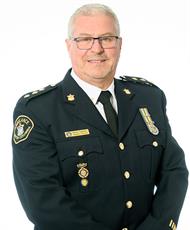
“He has a heart of gold, and he is the guy that goes out of his way, more than anybody I’ve ever met, to do everything in his power for his patients. I have never met anybody who puts it all on the line the way Brian did. And he did it for his patients.” – Richard Sadowski
For Brian Twaites, paramedicine was a calling. In 1982, Brian was the first high school work experience student to enter the BC Ambulance Service for a cooperative education placement. After working at five different stations for five different shifts in downtown Vancouver, Brian knew paramedicine was the career for him.
“On my first day, the area director for the Lower Mainland, Bob Baxter, told me to speak freely,” Brian recalls. “He asked what I was looking to get from this experience. So, I went for it. I said: ‘I want to go out on the street, and I want to see if this is something I can do - if I can handle it.’”
During his work term, Brian went on calls with primary care paramedics (PCPs), advanced care paramedics (ACPs), and
Morris Ebanks from the Infant Transport Team, who later became a good friend. Brian thrived in the environment and says he ‘caught the bug’ for paramedicine.
“When I did my exit interview, I said this was successful to me and I wanted to do this,” Brian says. “Bob gave me instructions to get my industrial first aid certification and a class 4 driver’s license – and to apply to the service once I turned 19.”
Coupled with his first aid work with Scouts Canada and the St. John Ambulance (SJA) brigade, Brian was a natural fit for the role. So, in 1983, Brian applied to BCEHS. At the time, the organization wasn’t hiring in Vancouver and Brian couldn’t land a paramedic position. Through his connections with SJA, Brian was hired at the Justice Institute of B.C. as an instructor’s assistant. He also shadowed various ambulance crews to gain more experience and estimates attending approximately 2,000 calls riding with BCEHS paramedics.
In 1986, Brian was hired as a part-time paramedic for BCEHS. Part-time paramedic David Hilder was coming up in the service at the same time, and he and Brian became fast friends.
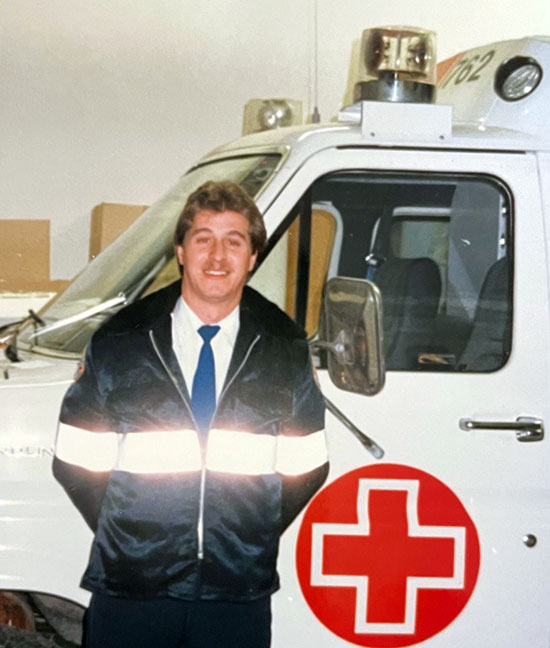
Brian Twaites in 1986
“It was quite a small community, so we all knew who the full-timers were, and who the part-timers were,” David says. “We had a bit of rivalry on which station was busier, what area was more fun to work in.”
By 1991, Brian secured a full-time role in the Vancouver post.
Brian and David maintained their professional and personal relationship – crossing paths often in their various roles and even training together with the Vancouver Police to become an important component of the Vancouver Public Safety Unit.
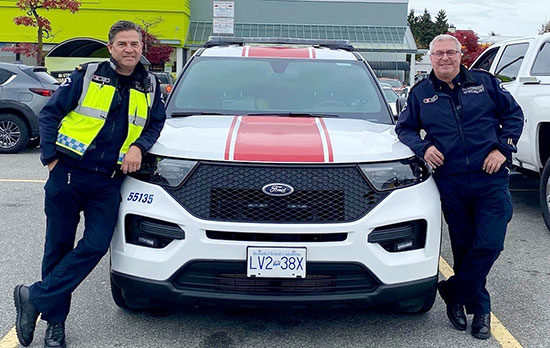
L to R: David Hilder, Brian Twaites in 2022
“Brian is an extremely proud person to wear the uniform. He personifies that uniform. When you think of Brian, I think of him in uniform. He’s always been a really good ambassador for really great patient care and also for the service. He’s a people person. He brings people together. He’s always smiling and laughing and in a good mood.
He’s a great paramedic. A leader. A mentor. I don’t think you’ll find many people, if anyone, has anything bad to say about Brian.” - David Hilder
In 1997, Brian trained to become an ACP, a role licensed to provide advanced life support care to patients in B.C., along with clinical leadership on complex calls. ACPs also have a skillset that allows them to start emergency medical management in the field before the patient arrives at an emergency department.
Once Brian became a full-fledged ACP, he started working at the ACP station based at Vancouver General Hospital, where Richard Sadowski was his supervisor and unit chief.
“We were a natural team whenever we worked together,” Richard says. “We had fun together and the patients always had the best of care. He never took shortcuts. When it came to patient care, he just gave them everything he had.”
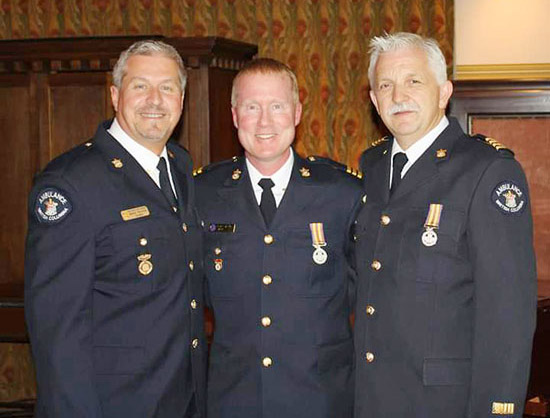
L to R: Brian Twaites, Richard Sadowski, Joe Puskaric receiving Exemplary Service Medals at Government House in Victoria, B.C. in 2013.
“As a Unit Chief, I was his leader for two decades. He’s one of those guys that you just had to basically provide him with the tools, and he took care of all the rest. Never in more than 20 years did I ever have to utter a word of discipline to him. He was accountable and self-reflective, and he was a dream employee.
I’m proud to call him my friend.” - Richard Sadowski
Kristina Anton, ACP and now Paramedic Practice Educator, was training to become an ACP when Brian became her mentor.
“Brian is very dear to me and probably the most influential person in my career,” Kristina says. “He was so supportive. It’s a rocky, challenging road and I came to him as very insecure and trying to figure out my practice. He helped to build me up.”
“I told Kristina to just be herself,” Brian says. “People realizing that you’re kind, you’re polite, and you’re competent is all you need to show you can be a leader in patient care.”
When Kristina was signed off as an ACP, Brian gave her his ‘wings’ – a tradition and mark of respect in the ambulance service. They then worked together as ACP partners from 2013-2016 – just a few years after Brian first met Kristina.
“We realized during her mentorship that we would work well together as partners,” Brian says.
“He was always so enthusiastic about it even after so many years working in a busy downtown station,” Kristina says. “At three in the morning he’d say: ‘We just need a good call’ and I’d say: ‘We need to sleep!’”
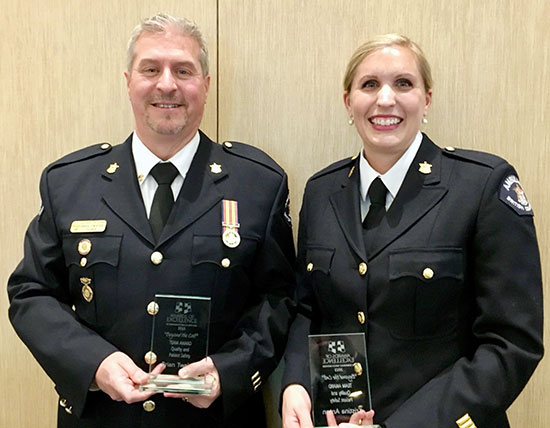
Brian Twaites, Kristina Anton receiving an award for their successful life-saving efforts.
In March of 2011, BCEHS introduced a proof-of-concept program to embed specialty-trained paramedics with the Vancouver Police Department (VPD) Public Safety Unit (PSU). Several BCEHS paramedics went through the VPD’s intake training for the PSU and tactical specific medical training, receiving extensive training in police tactics, crowd management, weapons and munitions as well as a tactical emergency casualty care (TECC) course.
Brian Twaites, Richard Sadowski and David Hilder were all embedded in these squads – along with three other BCEHS paramedics. All six participated in crowd control during the Vancouver Stanley Cup riot on June 15, 2011. Each was placed in an individual squad, behind the front lines, as medics for the police and members of the public who were injured or in medical distress.
“We spent hours and hours going through training and putting on protective gear,” David says. “I remember it being very surreal that night when the riot broke out and we were putting our stuff on, thinking about what we were about to do, and making sure we’re safe and everyone else is safe.”
“Once I had the gear and we were heading to the frontline, I just sort of collected myself and realized the training we did was amazing,” Brian says. “I did a systems check and thought to myself: ‘I did the training – I’m good. I’ve got my gear – I’m good. I’m with my squad – I’m good.’”
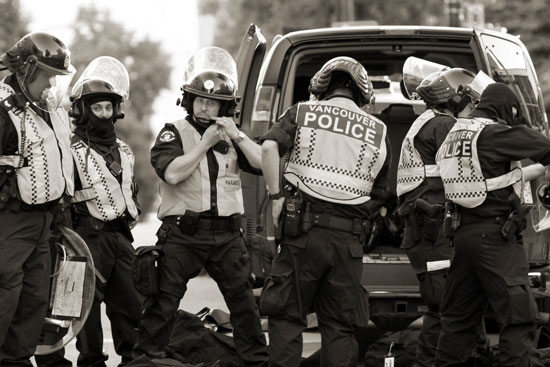
Brian Twaites (centre) gearing up as a member of the PSU on June 15, 2011.
“We did a lot of training with the police, and Brian has the best working relationship with the first responders in Vancouver,” Richard says. “We were fully deployed for five to seven hours. It was a hot night. We were treating police officers because people were throwing bricks – and Brian and I were right in the centre of it.”
After the action subsided, Brian and Richard took time to unwind from the events that had occurred that night.
“There was a park by my station,” Richard says. “After the riot was over, we went back, and we just sat there for about an hour. Some other paramedic crews came by as well. It was kind of neat. We just chilled. Brian and I sat in the park by Station 261 and had a cold drink at four in the morning. From that park, you could still see smoke hanging over downtown Vancouver.”
Richard and David both say the events of that evening bonded them with Brian in a different way.
“It’s hours later and you see each other and you’re kind of like, ‘Made it,’” David says. “You know what each other went through, but don’t have to talk about it much. It’s good to see somebody’s face that you’ve known for a long time. It’s a bonding moment and a big moment in Vancouver’s history.”
“I have so much respect for every member of law enforcement who was out on the street that night,” Brian says. “I can’t say that enough.”
As he gained more years of paramedic work experience, Brian started to bring his skills to other roles BCEHS is involved in, such as working in the International Protected Persons program with the RCMP. This role provides medical care in conjunction with the protective details for dignitaries, elected officials, celebrities and members of various monarchies. Highlights include being embedded with King Charles III (formerly Prince Charles) in 2009 and multiple U.S. Presidents throughout the years.
Over the years, Brian played an increasingly prominent role in the program and became deeply embedded and in very close relations with the RCMP and the U.S. Secret Service. During the 2010 Vancouver Olympics, BCEHS’ role was more formalized with a paramedic team dedicated to these duties.
He also had the opportunity to work on several Vancouver film sets as a personal medic for celebrities and major sporting teams through the BCEHS Planned Events team, which offers contracted paramedic services for planned and unplanned events throughout B.C.
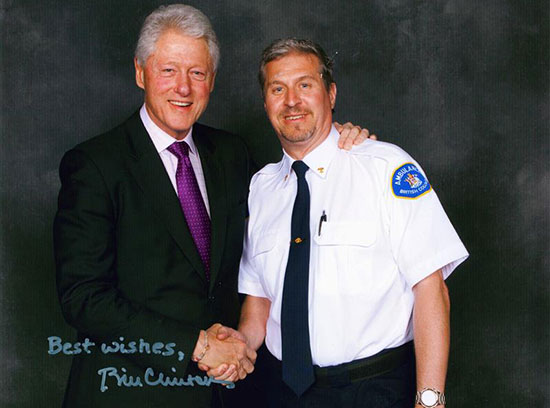
L to R: President Bill Clinton, Brian Twaites
In 2016, the toxic drug crisis in B.C. needed a focused organizational response. Brian and another ACP paramedic were asked to work as solo responders on paramedic response units (PRUs) in downtown Vancouver to help handle the increased call volume.
Embedding these PRUs in downtown Vancouver proved successful, and in 2017, Brian was one of the first ACPs invited to trial a new proof-of-concept Paramedic Specialist program. This program was an opportunity for an experienced ACP to work half-time in the dispatch centre and half-time in the field.
Paramedic specialists are able to provide advice on high-risk hazard responses to ensure paramedic safety, in addition to clinical support to paramedic crews working in the field and to dispatch teams needing advice and support on emergency calls. By continuing to practice in the field half time, the paramedic specialist continues to be clinically relevant.
“I’ve met some paramedics from some of the isolated areas in B.C.,” says Richard Sadowski. “To get people like Brian on the phone – they knew everything was going to be okay.”
After a successful trial of the program, Brian continued to work as a Paramedic Specialist until 2022.
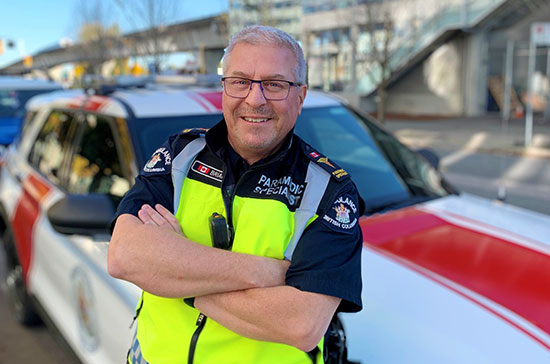
Brian Twaites as a Paramedic Specialist in 2022
Throughout Brian’s career, cardiac resuscitation has been a passion.
“We get the satisfaction of successfully treating a cardiac arrest, but it can be quite thankless at times,” Richard Sadowski says. “Brian didn’t do it for that. He did it because for him, it needed to be done, and he just poured everything he had into it. Everyone got treated to the best of his ability.”
“He was always really pushing and motivated to get there quickly and make a difference,” Kristina Anton recalls. “There were some good outcomes we were lucky to have. A lot of it is because he’s passionate about good quality care.”
Dr. Jim Christenson and Dr. Brian Grunau, well-known and respected physicians in pre-hospital cardiac arrest research, were cardiac care mentors to Brian. Brian was a clinical liaison for BCEHS for several pre-hospital cardiac care trials, which served to implement new protocols within the organization.
“We did many trials in resuscitation, trauma and stroke care,” Brian explains. “The results impacted the way that BCEHS paramedics performed pre-hospital cardiac care. Being involved with trials that improve outcomes, knowing that more patients are going to go home to their friends and family, has been so important to me.”
“He’s so passionate about the work and he really champions pre-hospital cardiac care,” Kristina Anton says. “He was always a mentor, always supporting up and coming practitioners. He’s so enthusiastic about the work.”
Over the years, Brian has also been deeply involved in creating the BCEHS Youth Pathways program, a way of introducing students to emergency health services.
“This is a way to hire youth already engaged and interested in paramedicine and help facilitate their pathway into it,” Brian says. “If they’re already expressing an interest in careers in paramedicine, hopefully they may turn into career medics.”
In his paramedic specialist role, Brian was featured on a CTV W5 documentary on the toxic drug crisis in Vancouver, and on CBC The National.
“I was asked to take a national news crew with me and also a BBC news crew,” Brian says. “Eventually this meant doing more and more media outreach for the organization because there was so much national and international attention on what was happening in B.C.”
This media outreach led to Brian’s current role since 2022 as a Public Information Officer for BCEHS – a job that sees him attending a variety of events representing the organization, shining a spotlight on the important work of paramedics, dispatchers, and emergency medical call-takers, and providing valuable information to help keep the public safe. He is also one of the faces of the organization’s social media channels.
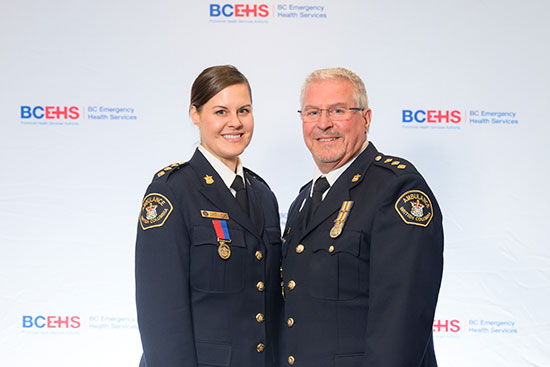
L to R: BCEHS Public Information Officers Rachelle Bown and Brian Twaites in 2024
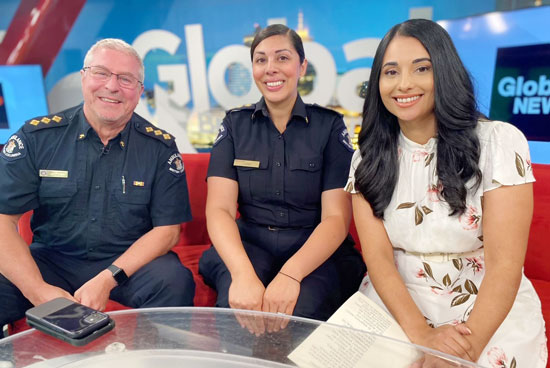
L to R: Brian Twaites and Jasprit Khandal on Global News Morning with host Sonia Sunger in 2023.
40 years into his career, Brian has not lost his enthusiasm for pre-hospital medicine.
“I keep my license current and take the opportunity to not only go out and provide patient care, but to also spend time with the crews and stay a part of the paramedic community,” Brian says. “For me and for all first responders, to last in this career would be hard without the love and support of family — considering how many holidays, birthdays and special events we miss because we’re working. But we make that sacrifice for our career.”
Despite the sacrifice, Brian is nothing but positive about paramedicine and the impact it has had on his life.
“I’ve had an amazing career,” Brian says. “I’ve been so fortunate. We get invited into people’s worlds. We meet people on an intimate level, and it’s humbling. Honestly, it’s the best job in the world.”

